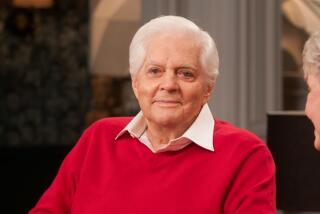House Career Ended by Elizabeth Ray Scandal : Ex-Rep. Wayne L. Hays of Ohio
- Share via
WHEELING, W. Va. — Wayne L. Hays, once one of the most powerful and feared men in the House of Representatives but whose affair with his secretary a dozen years ago touched off a scandal that destroyed his career, died Friday. He was 77.
The former Ohio Democrat died in the emergency room of Wheeling Hospital about noon PST, apparently of heart failure, nursing supervisor Linda Crook said. The Wheeling News Register said Hays had visited a heart specialist in Columbus, Ohio, on Thursday for tests.
Hays’ wife, Pat, was at his side when he died.
Hays began his political career in 1939, when he was elected mayor of Flushing, a town of 1,200 in his native Belmont County in rural eastern Ohio.
He was elected to the House in 1948. When he quit under fire on Sept. 1, 1976, he was finishing his 14th two-year term in Congress and was chairman of the powerful House Administration Committee. He resigned to stop a House Ethics Committee investigation into his conduct with secretary Elizabeth Ray. Public hearings were to begin 2 1/2 weeks later.
Ray had been hired as a secretary but said she actually was paid to serve as Hays’ mistress. She later admitted that she could not even type.
“I can’t type. I can’t file. I can’t even answer the phone,” Ray, 33 at the time, told reporters. She had earned $14,000 a year for two years on Hays’ payroll.
Hays had remarried just six weeks before the Ray scandal broke. The previous year he had divorced his first wife of 25 years.
Ray’s disclosures followed an incident in which Hays ordered Capitol Police to escort her out of his office. She said she had gone to his office to ask why she had not been invited to Hays’ wedding when the rest of the staff had.
Ray met with reporters for the Washington Post later that same day. “It’s not that I care so much about (Hays) getting married,” she said, “but it looks bad that I’m not invited. I was good enough to be his mistress for two years, but not good enough to be invited to his wedding.”
At first Hays denied, then acknowledged in a tearful speech before the House that he was having an affair with Ray. But he steadfastly denied her charges that she was kept on his payroll only to have sex with him.
After his resignation, the Ethics Committee voted to end its three-month investigation of the scandal on grounds that Hays no longer was a congressman and no longer under the panel’s jurisdiction.
The Justice Department, which also investigated the matter, decided not to prosecute. Department attorneys said they lacked evidence corroborating Ray’s account and her relationship with Hays.
‘I think he did it to save his family,” Carl Albert, then Speaker of the House, told reporters after receiving Hays’ resignation letter.
In his letter of resignation, Hays said he was leaving Congress “with a heavy heart.” Hays denounced Ray as a publicity seeker and railed at the Washington Post for “harassment.”
His physical and emotional health also was a factor. He had been hospitalized in June, 1976, after taking an overdose of sleeping pills.
After leaving office, Hays returned to his 300-acre Red Gate Farm in Belmont, where he bred Angus cattle and Tennessee walking horses.
In 1978, Hays made a comeback of sorts with his election to the Ohio House. There, he pushed bills aimed at curbing big utilities and promoting Ohio coal, but generally kept a low profile. One exception came during an incident in which he threatened to punch a television cameraman during a hearing.
He was defeated in a reelection bid in 1980.
That same year, Hays became chairman of the Democratic Party in Belmont County and remained active in local party politics.
More to Read
Get the L.A. Times Politics newsletter
Deeply reported insights into legislation, politics and policy from Sacramento, Washington and beyond. In your inbox twice per week.
You may occasionally receive promotional content from the Los Angeles Times.










